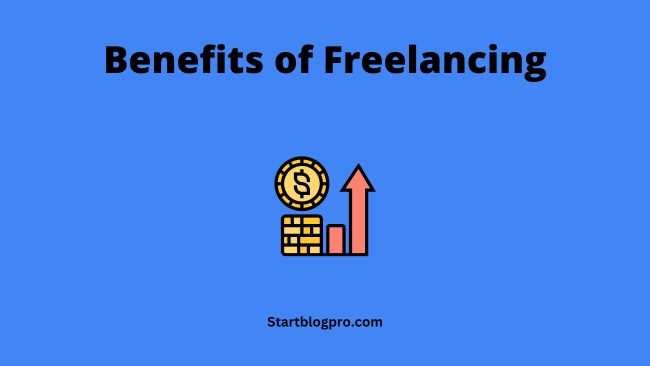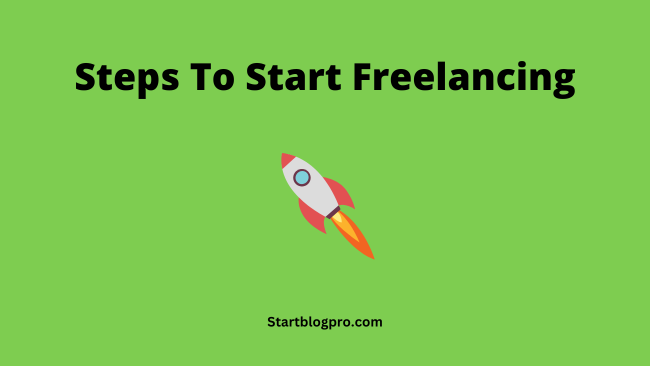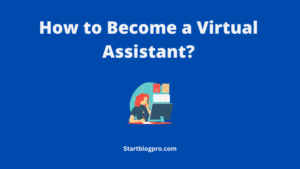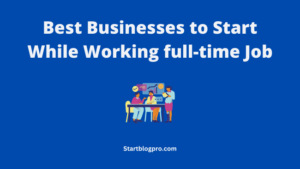Want to work from home as a freelancer? But don’t know how to start freelancing?
In recent times, there is an increase in the number of people looking for flexible working hours. More and more want to be their own boss.
In this article, we explain what is freelancing. What are the benefits of being a freelancer? and steps on how to start freelancing.
What is Freelancing?

Freelancing refers to working on a project or task basis for clients or companies. A freelancer is not an employee of a single employer. They have the liberty to choose projects and set their own rates. They plan their own working schedule.
Benefits of Freelancing

Flexible Schedule
Freelancing enables you to have a flexible working schedule. You decide your own working hours. This allows you to have a better work-life balance.
Whether you’re a night owl or prefer working during specific hours. Freelancing provides the flexibility to accommodate your preferences.
Independence and Autonomy
Freelancing empowers you to be your own boss. You have the autonomy to choose projects that align with your interests and skills.
It enables you to showcase your creativity and decide on your own terms. You are in full control of your professional journey.
Unlimited Earning Potential
Unlike traditional employment, freelancing offers unlimited earning potential. A freelancer’s income is not limited, unlike a fixed salary.
Instead, you set your own rates based on the value you provide to clients. You can increase your earning potential by gaining experience and expertise.
Steps to Start Freelancing

Here are the steps to start freelancing:
Identify Your Skills and Passion
The first step in your freelancing career is to identify your skills and passion. You should assess your strengths, interests, and areas of expertise.
This self-reflection helps you in determining the services you can offer. This allows you to pick up the niche to specialize in. Check out the post on how to find your blog niche.
Build a Portfolio
Building a portfolio is crucial for showcasing your skills and attracting potential clients. Create a collection of your best work samples that highlight your abilities.
If you’re starting out. Consider taking on free or low-paying projects to build your portfolio. You can start a blog for documenting your professional growth.
Set Your Rates and Goals
Before diving into freelancing, it’s essential to set your rates and goals. Research industry standards and consider your experience level to determine your pricing.
Set realistic short-term and long-term goals that align with your freelancing aspirations.
Create an Online Presence
It is crucial for you as a freelancer to have an online presence. You should create a professional website or portfolio. It will not only showcase your work but also provide information about your services. You can include your product or service pricing and your contact details.
Get on social media platforms like LinkedIn, Instagram, or Twitter. They allow you to build your professional presence. These platforms connect with other freelancers and with your potential clients.
Find Clients
Finding clients is a crucial step in starting your freelancing career. Explore online job platforms, freelance marketplaces, and professional networks to discover opportunities.
You should reach out to potential clients. Ensure your attendance at networking events. You can leverage your existing connections to expand your client base.
Tips for Success in Freelancing

Some of the best tips for succeeding in freelancing are:
Develop Time Management Skills
Effective time management is essential for freelancers. Create a schedule, prioritize tasks, and set deadlines. This will ensure that you deliver projects on time.
Use productivity tools and techniques such as time-blocking or the Pomodoro technique. This optimizes your workflow and maintains a healthy work-life balance.
Communicate Effectively
Clear and timely communication with clients is vital for successful freelancing. Update clients on the project’s progress. Address their concerns promptly, and maintain open lines of communication.
Effective communication fosters trust and ensures client satisfaction. It increases the likelihood of repeat business or referrals.
Deliver High-Quality Work
When you consistently deliver high-quality work. It builds your reputation as a reliable freelancer. Pay attention to detail, and meet project requirements. You should strive for excellence in every task.
You should go the extra mile. Exceeding client expectations sets you apart from the competition.
Nurture Client Relationships
Building strong client relationships is essential for long-term success in freelancing. Cultivate professional connections by providing exceptional service. Respond to the client’s feedback, and maintain a positive attitude.
A satisfied client is more likely to provide repeat work or refer you to others in their network.
Conclusion
Starting a freelancing career offers a world of opportunities for individuals. It provides flexibility, autonomy, and unlimited earning potential.
You can pave the way for a successful freelancing journey by
- Identifying your skills.
- Building a portfolio.
- Setting goals.
- Establishing an online presence.
- Nurturing client relationships
Remember to prioritize effective communication. Deliver high-quality work, and continuously improve your time management skills.
Embrace the freedom and possibilities that freelancing offers. With this, embark on a rewarding professional path.
FAQs
Q1. How long does it take for a freelancer to earn?
The time to earn as a freelancer can vary. It depends on factors such as your skills, networking efforts, and market demand. Some freelancers earn within a few weeks. Others may take several months to establish a steady income.
Q2. Do I need formal qualifications to freelance?
Formal qualifications are not always necessary to freelance. Many clients prioritize skills, experience, and a strong portfolio over formal degrees. But, certain fields may need specific certifications or qualifications. so it’s essential to research the requirements of your chosen industry.
Q3. How do I handle many clients and projects simultaneously?
Managing many clients and projects requires effective organization and time management. Use project management tools, create a schedule, and set priorities. Communicate clear timelines and expectations with each client. You should delegate tasks or consider outsourcing when necessary. This ensures you deliver high-quality work on time.
Q4. What are some common challenges freelancers face?
Freelancers may face challenges such as inconsistent income. Finding reliable clients, self-motivation, and work-life balance. You should expect these challenges and develop strategies to overcome them. For example, you can diversify your client base, and market your services effectively. You should establish boundaries between work and personal life.
Q5. How do I determine my freelance rates?
Determining your freelance rates involves considering factors. Such as your experience, skills, market demand, and the value you provide to clients. Research industry standards, assess your competition, and consider your financial goals when setting your rates. You should evaluate the scope and complexity of each project. This allows you to determine a fair price reflecting your expertise and the value you bring to the table.
I hope you are now clear on how to start freelancing. What are you planning to start?




